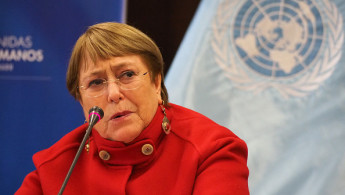Bangladesh activists brief UN rights chief Bachelet on 'police state's' human rights violations during visit
Bangladeshi activists said on Monday they briefed the visiting UN human rights chief on gross violations including extrajudicial killings and disappearances under Prime Minister Sheikh Hasina.
Michelle Bachelet is the first UN rights chief to visit Bangladesh, and is also due to visit camps housing hundreds of thousands of Rohingya refugees who fled a 2017 military onslaught in Myanmar.
She met with rights activists in Dhaka on Monday.
"We said (Bangladesh) is now a police state, not a people's state," said Sanjida Islam Tulee, a sister of an opposition official allegedly abducted by the notorious elite Rapid Action Battalion (RAB) in 2013 who never returned.
"We said more than 600 people have become victims of enforced disappearance by the state agencies," she told AFP, adding that they also spoke about the independence of the country's judiciary.
Tulee is a coordinator of Mayer Daak (The Call of the Mothers), which represents hundreds of victims of disappearances and their families, and those killed in allegedly staged police encounters.
In December, the United States imposed sanctions on the RAB as well as seven top security officers, including the national police chief, over gross human rights violations.
Activists say that since then, the situation has improved, nearly halting extrajudicial killings and disappearances.
The government denies the allegations of disappearances and extrajudicial killings, with one minister saying that some of those who went missing in fact fled Bangladesh.
Activists also raised strong concerns about Bangladesh's digital security laws, enacted in 2018, which international rights groups say have been used to silence dissent, curb freedom of expression and target journalists.
Bachelet met three ministers on Sunday.
They told her about how Bangladesh has suffered from terrorism and violence, that the media is free, and that there has been progress in reviewing the digital security law, the foreign ministry said in a statement.
They "highlighted the Government's sincere efforts to protect and promote human rights of the people", it added.
Bangladesh also sought Bachelet's help to repatriate Rohingya refugees to Myanmar.
Foreign Minister M.A. Momen said their presence in Bangladesh "bears the risk of the spread of radicalism, transnational crimes etc., and thus may hamper regional stability", according to his ministry's statement.
There was no comment from Bachelet's office.
The 70-year-old, a former Chilean president, is due to step down from her UN role at the end of the month.





 Follow the Middle East's top stories in English at The New Arab on Google News
Follow the Middle East's top stories in English at The New Arab on Google News


